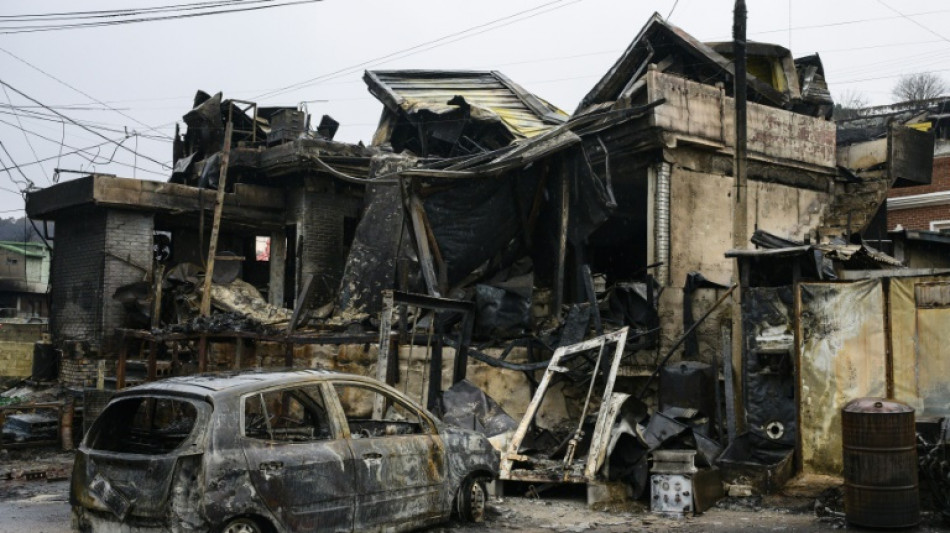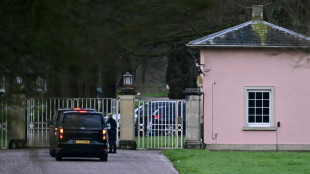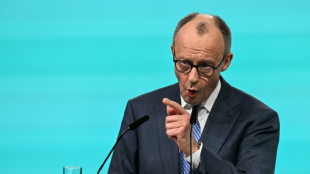
-
 Benfica investigate video of fans' monkey gestures
Benfica investigate video of fans' monkey gestures
-
French minister pledges tight security at rally for killed activist

-
 Guardiola 'couldn't care less' about Arsenal stumble in title race
Guardiola 'couldn't care less' about Arsenal stumble in title race
-
UK police search property as royals reel from Andrew's arrest

-
 Germany's Merz to visit China next week
Germany's Merz to visit China next week
-
Kompany says Mourinho made 'huge mistake' in Vinicius racism row

-
 X appeals EU's 120-mn-euro fine over digital content violations
X appeals EU's 120-mn-euro fine over digital content violations
-
Galthie recalls hulking locks Flament, Meafou for Italy

-
 Turkey, Saudi sign major solar power deal
Turkey, Saudi sign major solar power deal
-
US Olympic freeskier Hess embraces 'loser' tag after Trump blast

-
 European stocks rebound, oil prices ease after US-Iran volatility
European stocks rebound, oil prices ease after US-Iran volatility
-
'Alpha male' AI world shuts out women: computing prof Hall

-
 New Zealand freestyle skier Ives in hard Olympic crash
New Zealand freestyle skier Ives in hard Olympic crash
-
New Zealand must adapt quickly to Sri Lanka wickets: Chapman

-
 Thai activist's jail term for royal insult extended to 30 years
Thai activist's jail term for royal insult extended to 30 years
-
Families of Duterte's drug war victims eye Hague hearing with hope

-
 India chases 'DeepSeek moment' with homegrown AI
India chases 'DeepSeek moment' with homegrown AI
-
UN touts panel for 'human control' of AI at global summit

-
 Ukraine Paralympics team to boycott Opening Ceremony over Russian flag decision: statement
Ukraine Paralympics team to boycott Opening Ceremony over Russian flag decision: statement
-
UK monarchy reels from Andrew's stunning arrest

-
 Somaliland, where Muslims love Israel
Somaliland, where Muslims love Israel
-
Florida airport to be renamed after US President Donald Trump

-
 Fans flock to Japan zoo to see viral baby monkey Punch
Fans flock to Japan zoo to see viral baby monkey Punch
-
Stocks mixed, oil rises after Trump Iran threat

-
 Outspoken Laos lawmaker's election exit sparks rare dissent
Outspoken Laos lawmaker's election exit sparks rare dissent
-
Kim Jong Un vows to boost living standards as he opens rare congress

-
 Shepherd hat-trick to Samra ton: Five top T20 World Cup performances so far
Shepherd hat-trick to Samra ton: Five top T20 World Cup performances so far
-
Zimbabwe surprise as T20 World Cup Super Eights begin without Australia

-
 Victorious Takaichi promises 'strong and prosperous' Japan
Victorious Takaichi promises 'strong and prosperous' Japan
-
Ex-South Korea leader apologises for martial law crisis

-
 Ex-S. Korea leader apologises for martial law crisis
Ex-S. Korea leader apologises for martial law crisis
-
Messi kicks off MLS season in key World Cup year

-
 Teen burnout to Olympic gold: Alysa Liu 'looking to inspire others'
Teen burnout to Olympic gold: Alysa Liu 'looking to inspire others'
-
Cunningham stars as NBA-leading Pistons ease past Knicks

-
 Andre Gomes joins MLS side Columbus Crew
Andre Gomes joins MLS side Columbus Crew
-
Scottish inconsistency 'bugs everyone' says former international Beattie

-
 England turn to Pollock for Six Nations boost against Ireland
England turn to Pollock for Six Nations boost against Ireland
-
Arsenal aim to banish title jitters in Spurs showdown

-
 Scrutiny on Flick rises as Barca seek recovery
Scrutiny on Flick rises as Barca seek recovery
-
Leipzig host red-hot Dortmund with Champions League hopes slipping away

-
 Nvidia nears deal for scaled-down investment in OpenAI: report
Nvidia nears deal for scaled-down investment in OpenAI: report
-
Japan inflation eases in welcome news for PM Takaichi

-
 McIlroy shares Riviera clubhouse lead as Rai charges, Scheffler fades
McIlroy shares Riviera clubhouse lead as Rai charges, Scheffler fades
-
Philippines' Duterte earned global infamy, praise at home

-
 Stocks drop, oil rises after Trump Iran threat
Stocks drop, oil rises after Trump Iran threat
-
As European heads roll from Epstein links, US fallout muted

-
 Families of Duterte's drug war victims eye Hague hearing hopefully
Families of Duterte's drug war victims eye Hague hearing hopefully
-
Russian decision is a betrayal: Ukrainian Paralympics chief

-
 Venezuela parliament unanimously approves amnesty law
Venezuela parliament unanimously approves amnesty law
-
Martinez missing as Inter limp to Lecce after Bodo/Glimt humbling


Climate change made fire conditions twice as likely in South Korea blazes: study
Human-induced climate change made the ultra-dry and warm conditions that fanned South Korea's deadliest wildfires in history this March twice as likely and more intense, researchers said Thursday.
Vast swaths of the country's southeast were burned in a series of blazes in March, which killed 31 people and destroyed historic sites, including a some thousand-year-old temple site.
The affected area had been experiencing below-average rainfall for months and was then hit by strong winds, local officials said, following South Korea's hottest year on record in 2024.
The hot, dry and windy conditions that fed the flames were "twice as likely and about 15 percent more intense" due to human-caused climate change, said World Weather Attribution, a scientific network that studies the influence of global warming on extreme weather.
"South Korea's deadliest wildfires were made much more likely by climate change," said Clair Barnes, a WWA researcher from the Centre for Environmental Policy, Imperial College London.
Officials said at the time that the conditions made it very hard for conventional firefighting methods to control the blazes, which leapt from pine tree to pine tree across dried-out hillsides.
"These unprecedented conditions exposed the limits of even well-developed suppression systems," WWA said in a report of its findings.
"With fires increasingly likely to exceed control capacity, the emphasis must shift toward proactive risk reduction," it added.
More than 62 percent of South Korea is covered in forest, the report said, with dense tree cover especially prominent along the eastern coast and in mountainous regions, landscapes that significantly influence how wildfires spread.
Around 11 percent of South Korea's forested areas border human settlements, the study said.
"These areas are particularly susceptible to ignition and have accounted for nearly 30 percent of wildfires recorded between 2016 and 2022."
The researchers' findings were most conclusive regarding the increased likelihood of fire weather -- which is measured by the Hot-Dry-Windy Index (HDWI) -- and higher maximum temperatures.
But they found no attributable link between climate change and rainfall levels during the period surrounding the fires.
- Fires rage -
South Korea has few energy resources of its own and relies on imported coal -- a cheap but dirty fuel -- for around a third of the electricity powering it, according to figures from the International Energy Agency.
The inferno in March also laid bare the country's demographic crisis and regional disparities, as rural areas are both underpopulated and disproportionately home to senior citizens.
Many of the dead were seniors, and experts have warned that it will be hard for people to rebuild their lives in the burn zone.
In the weeks and months since, South Korea has recorded a string of wildfires.
In April, helicopters were deployed to contain a wildfire within the DMZ, the buffer zone separating the South from nuclear-armed North Korea.
This week, more than 2,000 people were forced to evacuate after wildfires occurred in parts of the southeastern city of Daegu, after a blaze broke out on Mount Hamji in the region.
WWA is a pioneer in attribution science, which uses peer-reviewed methods to quickly assess the possible influence of climate change on extreme weather events.
This allows a comparison of observations from today's climate, with some 1.3 degrees Celsius of warming, against computer simulations that consider the climate before humanity started burning fossil fuels in the 1800s.
S.F.Warren--AMWN

